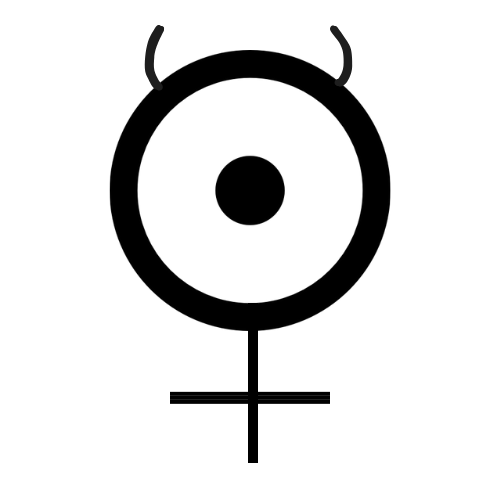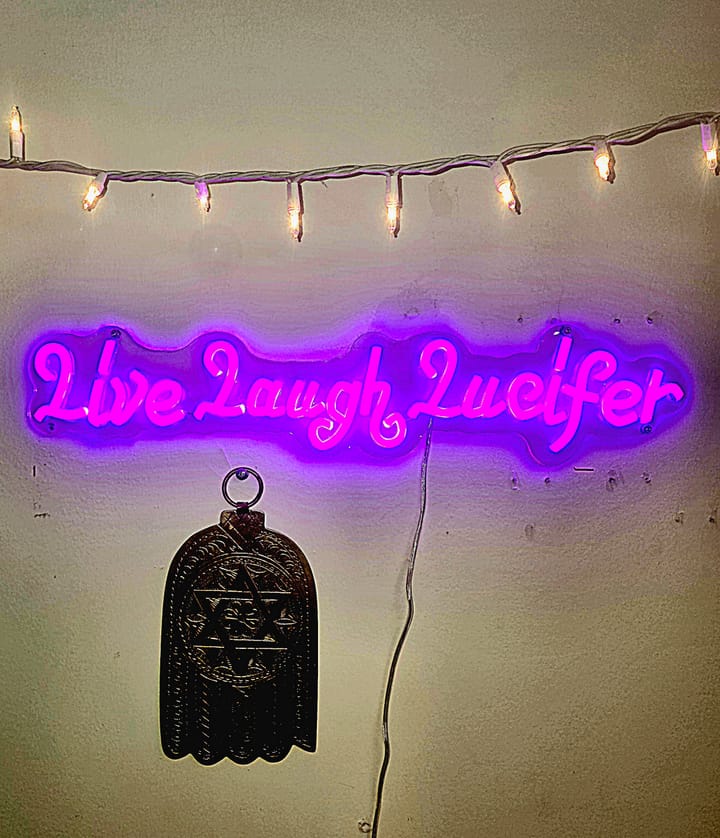A Polyamory Flop: Rethinking Non-Hierarchical
I should not be dating anyone at all right now. I keep saying this over and over again. But I do have an on and off thing with this girl—entirely in the astral, which is its own complex thing—and she's monogamous. I have identified as poly for about a year, but felt enormous relief when a dude in my local trans masc group chat and my new housemate both shared with me that they were monogamous. Like, oh, even though I'm trans and a leftist, polyamory is still a choice.
You wouldn't know that from queer communities*, which treat everything leftist and counterculture like a fundamentalist religion. You don't just have to be polyam, you have to be a specific type of polyam. You have to be non-hierarchical polyam. You have to be a relationship anarchist. You have to have many different people in your life (cool! agreed!) and 2 or more partners (cool, if you can get there!) and treat everyone as if they're just as important as each other regardless of the type of connection they have with you (wait... all the time?)
(Yes, all the time.)
One of the primary arguments against "hierarchical polyamory" is that it's basically monogamy, and monogamy is bad because its a "colonialist" structure. Not that its ubiquity comes from colonialism. Just that it exists at all. This is somehow ethically terrible despite the number of people who are monogamous who once tried polyamory and found that it didn't work for them because of their personal capabilities and preferences.
Some people also argue that "hierarchical polyamory" strips autonomy away from the non-primary partners because the primary partner can nix the relationships. This seems extreme to me. As long as everyone is aware of the structure of all relationships one poly person has and is a consenting adult, there is objectively no problem with such an arrangement. I think these people also need to remember that sometimes relationships, even monogamous ones, often just don't work out because they don't compatibly fit into the bigger picture of the lives of the people involved. Does that hurt? Sure, but break ups in general tend to feel bad as I can attest from mine this week.
If you don't want participation in a hierarchical style of polyamory, that's one thing. But that doesn't mean hierarchical polyamory is unethical or universally doesn't fit when polyamory is supposedly about diversifying the options and possibilities of relationships. Once you start closing the possibilities, you become controlling and rigid toward other people.
Also... despite what one of the above images may maintain, hierarchical polyamory isn't just a white concept. There's the stories of darling, beloved Jacob in the Bible after all (I said hierarchical and not white, not necessarily ethical!). Speaking of:
I'm not sure this person is talking specifically about polyamory, but this was shared by one of the large polyamory accounts I got the first set of images from. Following this logic, my making a thorough moral inventory, doing a lot of thought over the course of a year, and incorporating my very ethnic Jewish background into aiming to build a havurah is me having "limited imagination" as they say in another post. Because I'm supposed to work through my inherent characteristic of finding most people tedious, invite them into the structure I am designing for my personal needs and long-term happiness, and ultimately sabotage those goals in order to adhere to someone else's idea of community otherwise I am a bad person. Anyway, this is partially why I have felt increasingly alienated from calling myself "white"; while I'm legally white and do very much benefit from white privilege, not all white people come from bland, individualistic backgrounds.
My revulsion toward another point I saw somewhere from the online polyamory space felt particularly Jewish, though I can't quite describe why. I perhaps luckily can't find the exact post again, but the overall point was this:
You should not prioritize your partners with whom you have children over your partners who you don't because that's hurtful.
There seems to be a common denominator in these posts where when people get hurt feelings, the solution isn't for them to process those feelings, but for everyone else who practices polyamory to change their behavior en masse. Coming from a lifetime of having Jewish community: you can have community and still prioritize your children and the partners you have who are helping you raise them. In fact, most "communities" expect this and there are cultural types of polyamory—I'm particularly thinking of the French—that do as well.
While I may not be a parent yet, it's one of my big future life goals. In case you haven't heard, kids are a challenge to raise. They have their difficult, dependent phases when they're younger and even when they're older, you sometimes only get 5 minutes to yourself in between ushering them to school and their extracurricular activities. While there are alternative parenting arrangements, if you are specifically having a child with someone, it makes sense that you would prioritize them more than your other partners by the sheer logistics of raising your kids. Even if you don't intentionally do that, I don't see how you don't end up accidentally doing it through your child's needs, which are never going to be consistent or completely without urgency. Also... I simply don't want to prioritize anyone above my children and their other parent(s?).
Polyam people who are actually experiencing this agree:
This realization has me revisiting my previous polyamory and havurah plans. My recently former podmate, who I had once significantly factored into my found family decision-making, is childfree. My remaining podmate loves kids and would help me raise mine except he just moved out of my city and is never coming back. As a result, neither of them were ever going to be as important to me as my future partner(s?) whom I intend to live, share finances, and raise children with. I would adore to have what I have seen online, which is two partners and a metamour helping my children with their homework at the kitchen table. Other people pitching in as aunts, uncles, and auncles are very much welcome, but that is not the same thing as co-parenting and there is no way I would have the resources to to treat them equally to my primary partners.
~
Then there's my personal polyamory fail, which happened this week.
Ideologically, polyamory sounded great to me when I read about it. A lot of polyamorous thinkers have incredible insights on how relationships function and innovative ideas for how we can change our social networks. Inspired by them, I asked my best friend of 2 years to be my podmate, which we agreed was equivalent to queer-platonic wife. We stated that our dynamic wasn't going to change from what it was before, which was emotionally intimate, sometimes cuddly, and typically independent. Putting the label "podmate" was to make life decisions like an extended family, such as deciding to move only within close proximity to one another whenever we did in the future.
However, things changed as they inevitably do. Apparently, she experienced jealousy with other people in my life and felt our relationship shifted, but never vocalized it until our final conversation. And I found myself overwhelmed with the notion that making our relationship "official" in some way didn't just affect my havurah efforts; it meant I had entered into her polycule as well.
Even though this was a lite form of polyamory, I ultimately felt myself take on a new balance of my needs versus hers in a whole new way. I felt expected to be more emotionally present and communicative, which was a huge shift from when I was single. Attending some of her events before were optional as a friend and not so optional when I was a podmate, unless and then it turns out even not excepting when I was sick.
It came out that my metamour didn't like me anymore—they claimed otherwise, but "you changed since you have progressed on your transition" doesn't mean anything else other than they liked your eggshell. The hurt and awkwardness of the situation was not helped by my former podmate assuming this was just a misunderstanding we could reconcile and still encouraging us to live together. While myself and my former metamour quickly resolved to not, I felt put off by my podmate's inability to see a fundamental incompatibility through her personal kitchen table polyam ideal of having her partners co-habitate.
Issues did not stop at my metamour. As I became an integral part of my podmate's relationship network, I felt overwhelmed as her relationships changed much faster than mine ever did. As if to match her and my metamour, I was often pressured into dating and fucking people when I didn't want to and doing so caused me emotional damage.
I own that I gave my former podmate too much power and influence over my decisions. I met her when I first moved to Southern California and both her and I helped each other through our major break ups with our former partners. My people pleasing tendencies I brought over from my past life on the East Coast were moved onto her. All in all, our relationship possibly always would have become toxic to my work on getting out of co-dependency and individuating. The breaking point came when her needs competed with my needs regarding my gender transition.
It could be that this was just the wrong person to practice polyamory with. My former podmate self-admittedly has problems confronting people or speaking up when she needs to, which is a recipe for communication failure. For my part, I didn't recognize much of the above at the time it was happening, didn't communicate some of what I did recognize, and felt ignored about what I did communicate. Testosterone has helped me realize that I am truly tired of my lifelong habit of chameleonizing myself in conversation and relationships. The fact of the matter is, I am never going to have sustainable long-term relationships of any kind if I do not start standing more securely and authentically as my own ally. Fortunately, that is exactly what my transition will force me to do.
I don't know what this means yet for my future in terms of relationship style. The gods and my other spirit allies will ultimately help me decide if customizable monogamy or slow, intentional polyamory is what helps me connect with the people who are right for me. In the meantime, I am so thrilled to close some doors that aren't right for me after all and get back to where I was months ago, which is to work on my relationship with me.
*Most of my examples are from the online polyamory space, but I have seen a lot of the talking points I mention in this blogpost repeated on Lex, which is an app for local community. The opinions of extremist online groups and those of local communities come closer together thanks to younger people and disabled people, both who spend more average time online than other local community members, bringing ideas from social media into in-person interactions.



